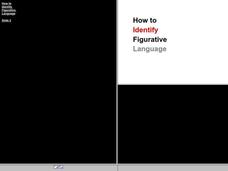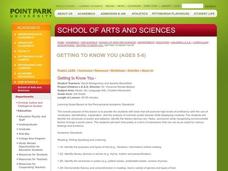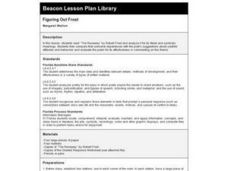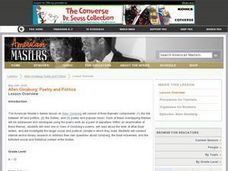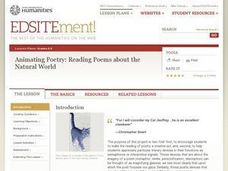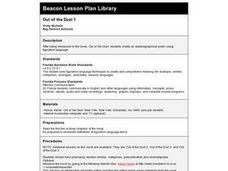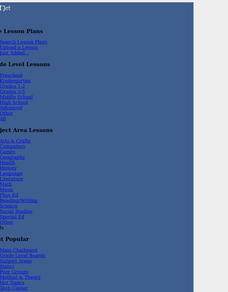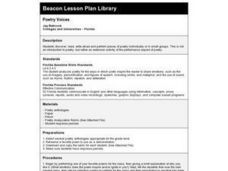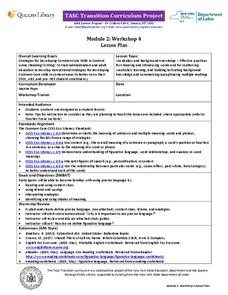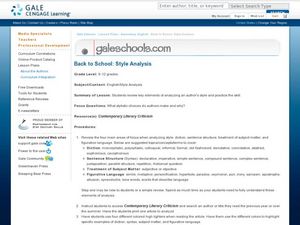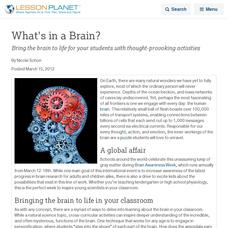Curated OER
How To Identify Figurative Language
Students investigate writing techniques by analyzing a chart. In this figurative language lesson, students define similes, metaphors and identify the difference between them and personification. Students demonstrate their understanding...
Curated OER
Romeo and Juliet: Quotes
In this Romeo and Juliet worksheet, students read 5 passages from Romeo and Juliet and identify the speaker, explain the significance of the excerpt in terms dramatic devices, plot development, character revelation, thematic...
Curated OER
Christmas Poetry
Students explore writing using literary terms. In this Christmas poetry lesson, students write a poem about a Christmas tree or a snowman using at least one example of each: metaphor, simile, and personification.
Curated OER
Political Cartoons: Thinking Broadly, Communicating Succinctly
High schoolers think broadly about the tsunami disaster and its aftermath through studying cartoons. Students critically think about the literary devices the authors/artists use, such as satire, metaphor and personification.
Curated OER
Georgia Performance Standards Framework for ELA Unit 6-8th grade
Eighth graders explore figurative language through the study of picture books. In this figurative language lesson, 8th graders listen to books and chart the figurative language that they hear. Students discuss examples in groups.
Curated OER
It's All Poetry to Me!
Fourth graders explore language arts by analyzing poetry styles. In this writing analysis lesson, 4th graders read several sample poems in class and identify similes, metaphors and other figurative language within them. Students analyze...
Curated OER
Getting to Know You
Third graders explore different types of poetry and illustrate their own experiences through creating their own poem. In this getting to know you lesson plan, 3rd graders create and recite their poems with a self-portrait.
Curated OER
Oliver/Kenyon
Young scholars, through two pieces of writing, identify poetic/language devices through the speakers, personification , imagery, metaphor, etc. They assess the patterns those devices are used in and analyze the theme of each. Each...
Curated OER
Extreme Poetry Vocabulary
Challenge your class with this comprehensive list of literary vocabulary words. Learners take a pre-test, look up definitions, come up with an example, and then take a post-test. You might use this prior to a unit about poetic devices in...
Curated OER
Figuring Out Frost
Fourth graders read "The Runaway" by Robert Frost and analyze it for its literal and symbolic meanings. They compare their personal experiences with the poet's suggestions about youthful attitudes and behaviors. Some nice worksheets are...
Curated OER
Allen Ginsberg: Poetry and Politics
Students explore the poetry of Allen Ginsberg. They read and analyze poems by Allen Ginsberg, conduct Internet research, collect examples of art of the 60s, and create a presentation.
National Endowment for the Humanities
Animating Poetry: Reading Poems about the Natural World
Students complete poetry analysis activities. In this poetry analysis instructional activity, students consider the use of imagery and sound devices in poetry. Students translate poetry into another art, read a diverse selection of...
Curated OER
Oh, Let the Rain Fall Down
Fifth graders explain the three phases of the water cycle in a narraive paragraph where they describe the journey of a single raindrop. They are introduced to five science vocabulary words and personfication.
Curated OER
Out of the Dust 1
Pupils review figurative languages terms and examples. They read the first entry in the book, Out of the Dust, and discuss the images created by the author. Then they create an autobiographical poem using figurative language.
Curated OER
Out of the Dust 4
Eighth graders read the novel, "Out of the Dust," and create a free-verse poem about a treasure of their own. They use the attached checklist to evaluate their own poem.
Curated OER
Pictures in Words: Poems of Tennyson and Noyes
Eleventh graders describe and analyze the effects of poetry on readers. They participate in an Internet scavenger hunt, an exercise involving interpretation of poetry through visual art, and an opportunity for students to create their...
Curated OER
Poetry Sings
Students examine examples of literary terms in poetry. Then they choose two songs, write out the lyrics, and decipher what they think the artist is trying to say. Each student presents their song to the class and they cite examples of...
Curated OER
Figurative Language Scavenger Hunt
Eighth graders analyze and interpret figurative language. They listen to some examples of poetry which use figurative language. Then, they divide into groups and attempt to find more examples. Finally, 8th graders write what the poet is...
Curated OER
Poetry Voices
Students investigate the performance aspect of poetry by reading, writing and discussing poetry pieces.
Curated OER
The Power of Poetry
Students utilize the Internet to research figures of speech used in poetry and poetry terms
Curated OER
Journeying to Create
Show a video clip that descripes how taking a journey can change a person's outlook on life. Learners write a paragraph about a place that uses imagery and tone to create a specfic effect. They evaluate their journal entries as well.
New York State Education Department
TASC Transition Curriculum: Workshop 4
Why is it important to use precise language? Participants explore this question in the fourth activity in a series of 15 on effective instruction. Perfect for all content areas, the activity promotes appropriate language choice through...
Curated OER
Back to School: Style Analysis
Jump back into expository writing and analysis at the start of a new school year! Start with a review of an authors' stylistic choices in diction, syntax, treatment of subject matter, and figurative language. Writers choose a text to...
Curated OER
What's in a Brain?
Bring the brain to life for your students with thought-provoking activities


